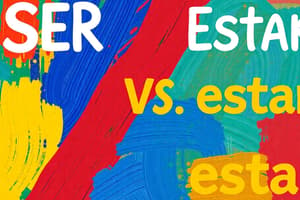Podcast
Questions and Answers
What is the fundamental difference between ser and estar?
What is the fundamental difference between ser and estar?
Ser is used in enduring situations, while estar is used in short-term situations, location, or results of actions.
What verb is always used when the verb 'to be' is followed by a noun?
What verb is always used when the verb 'to be' is followed by a noun?
Ser
When should you use ser when the verb 'to be' is followed by an adjective?
When should you use ser when the verb 'to be' is followed by an adjective?
When referring to an essential characteristic.
How does the verb used change the meaning of adjectives?
How does the verb used change the meaning of adjectives?
What do you use to describe origin?
What do you use to describe origin?
What verb is used to describe location?
What verb is used to describe location?
What verb do you use to indicate where an event is taking place?
What verb do you use to indicate where an event is taking place?
What are the present tense conjugations for ser for 'I am' and 'he/she is'?
What are the present tense conjugations for ser for 'I am' and 'he/she is'?
What are the present tense conjugations for estar?
What are the present tense conjugations for estar?
List some uses of ser in Spanish.
List some uses of ser in Spanish.
List some uses of estar in Spanish.
List some uses of estar in Spanish.
Flashcards are hidden until you start studying
Study Notes
Ser vs. Estar Overview
- "Ser" is used for enduring situations, character traits, and inherent qualities.
- "Estar" is used for temporary states, locations, or outcomes of actions.
When to Use Ser and Estar
- Use "ser" when followed by a noun; acts like an equal sign linking identity (e.g., “Juan es médico” means "Juan is a doctor").
- Use "ser" for essential characteristics with adjectives; "estar" for current states.
- Example: "La sopa está fría" (The soup is cold - temporary state) vs. "Los elefantes son grandes" (Elephants are big - essential characteristic).
Meaning Change with Adjectives
- Adjective meaning can change with the verb used:
- "El profesor está aburrido" (The professor is bored - current state).
- "El profesor es aburrido" (The professor is boring - inherent trait).
Distinguishing Uses
- "Ser" indicates origin: "Mónica es de España" (Mónica is from Spain).
- "Estar" indicates location: "Mónica está en Venezuela" (Mónica is in Venezuela).
- "Ser" is used for events: "La fiesta es en la casa de Mónica" (The party is at Mónica's house).
Key Uses of Ser and Estar
- "Ser":
- Nouns or essential characteristics.
- Describes origin and events location.
- "Estar":
- Current location and temporary states.
Present Tense Conjugation
- "Ser":
- yo soy - I am
- tú eres - you are
- él/ella/usted es - he/she is, you are (formal)
- nosotros/nosotras somos - we are
- "Estar":
- está - he is / she is / you are (singular formal)
- estamos - we are
- estáis - you are (plural informal)
- están - they are / you are (plural formal)
Specific Uses of Ser
- Identity details: physical description, profession, nationality, origin.
- Time considerations: days, dates, seasons, events.
- Specifies possession: describes ownership of objects.
Specific Uses of Estar
- Emotional, physical, and mental conditions of individuals.
- Describes locations of people and objects (but not events).
- Used in present progressive tense to describe ongoing actions.
Studying That Suits You
Use AI to generate personalized quizzes and flashcards to suit your learning preferences.




